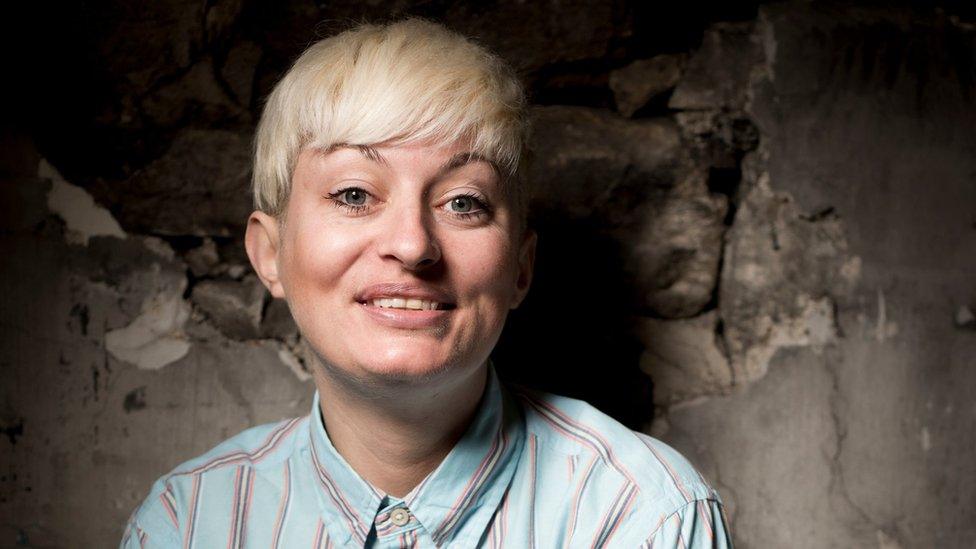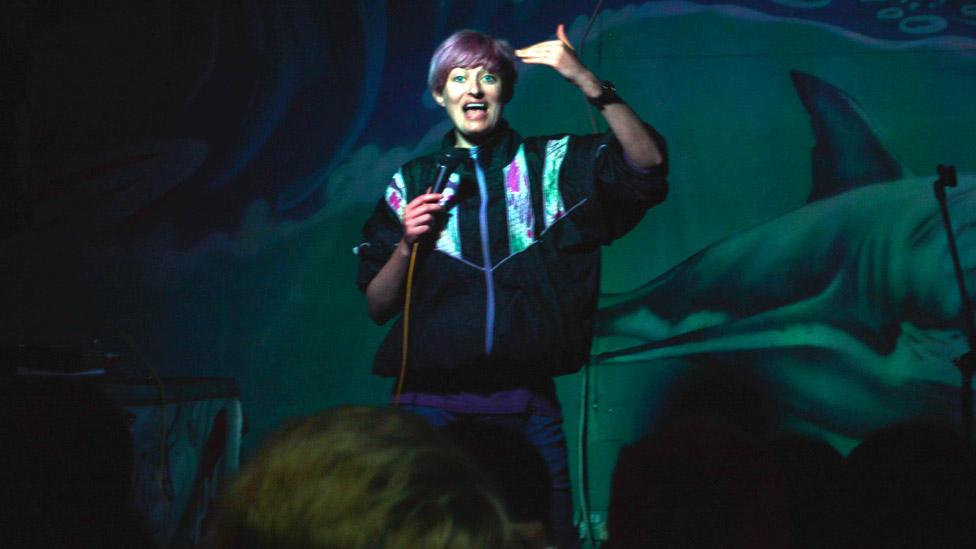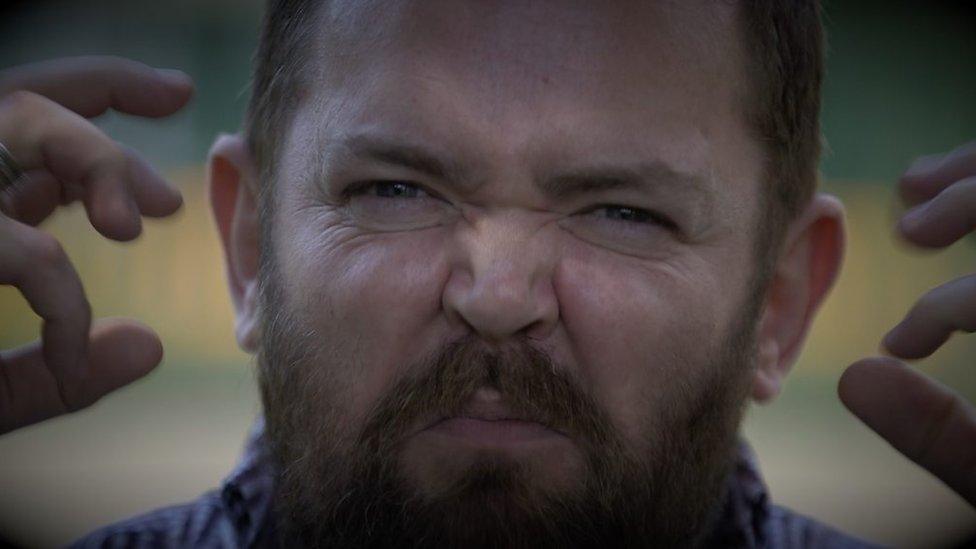The comedians making mental health a laughing matter
- Published

Harriet Dyer wrote her dissertation on whether all comedians are dysfunctional
For stand-up comedian Harriet Dyer, funny moments can be found even in life's most painful experiences - and laughing about them on stage can make a big difference.
Dyer is the founder and compère of Manchester's award-winning monthly Barking Tales comedy night, where she and fellow comedians often perform routines about their struggles with mental health.
"Last month I did some material that was quite dark, and about some awful stuff that happened to me," Dyer says. "And it went down so well that afterwards I felt it was so cathartic.
"So many people perform and say, 'Oh, it really helped, talking about that'. It really helps me sometimes, and it really helps the people that come."
Barking Tales recently won Manchester Evening News City Life's award, external for best comedy night, and Dyer also hosts the podcast Don't Worry Bi(polar) Happy.
She set up Barking Tales after audience members told her how they felt able to open up about their own mental health after seeing her 2014 Edinburgh Fringe show, titled Barking at Aeroplanes.

Barking Tales has been running in Manchester since 2015
A big part of Barking Tales' appeal is that it is a "safe space" for performers and punters alike.
People sitting in the front row are never picked on - at least never without being asked politely first - while comedians know they will get a sympathetic ear for stories and topics that might feel out of place at a regular, rowdier night.
To talk - and laugh - about painful personal experiences takes honesty, courage and a lack of the usual comic bravado. And that, in turn, means the audience often feels a deeper connection with the performers.
"A lot of the time, newer acts do better here because there have been fewer years of building up bravado," Dyer says.
"Whereas sometimes the acts that have been going for longer, you can see them panicking because they feel a bit out of water."
'You can find the farce in everything'
Ros Ballinger was on the bill at the most recent Barking Tales, with a routine touching on bereavement, depression and therapy.
She had been wary of trying that material at other comedy nights because "it's quite heavy and the mood has to be right".
Despite the heavy material, there's humour to be mined from the absurd situations and awkward interactions you can encounter, she says.
"I think you can find the farce in everything. When you go through certain things, farcical elements will crop up, even with bereavements and things.
"Anything that's high emotional intensity, silliness comes attached to it, which means all the social rules have gone off, which means people react differently or strange things can happen.
"And people use humour to cope with all that. I know I have."
Fellow stand-up Tim Andrews says he likes "the therapeutic benefits of taking something that's potentially quite painful and troubling in your life and presenting it as entertainment".
He continues: "This night is completely unique in the sense that not only is that expected of performers, but it probably wouldn't be as well received anywhere else.
"I'm really disappointed when I see a comedian get up on that stage and just do the material they could do down the Frog & Apple. I want an insight.
"I've seen some comedians here and you have no idea that they were going through the things they're experiencing."
'A lot of laughter comes from despair'
Comedian Kat Molinari has also performed at Barking Tales. "When I tell a joke about what I would do on an average depression day, if the audience laughs, it makes me feel a bit less lonely and I'm like, 'Oh OK, so they understand this too,'" she says.
"Or even if they don't understand it, they find it funny and they're not judging me."
She is currently writing material about the effect her last job had on her mental health. "They say in comedy, what's rubbish now will be great material later, and it's so true," she says.
"It's not the same for everyone, but for me it's therapeutic to talk about it - but it's more about making other people laugh because you want to make people feel the way that you don't.
"Traditionally the clown is very sad on the inside and it's the same with comedians. We're very sad people. A lot of laughter comes from despair."
Dyer even wrote a dissertation titled: Is it necessary to be dysfunctional in order to be a successful stand-up comedian?
So what did she conclude?
"It depends what you class as dysfunctional, but on the whole I couldn't really find anyone who wasn't," she replies.
"Sometimes when people start comedy, I think, why are you doing this, you seem very normal.
"And then the more I get to know them, it's like, oh yes - you're one of us."
Barking Tales is on the first Wednesday of every month at Zombie Shack in Manchester.

Follow us on Facebook, external, on Twitter @BBCNewsEnts, external, or on Instagram at bbcnewsents, external. If you have a story suggestion email entertainment.news@bbc.co.uk, external.
- Published7 May 2019

- Published10 October 2018

- Published22 July 2015
